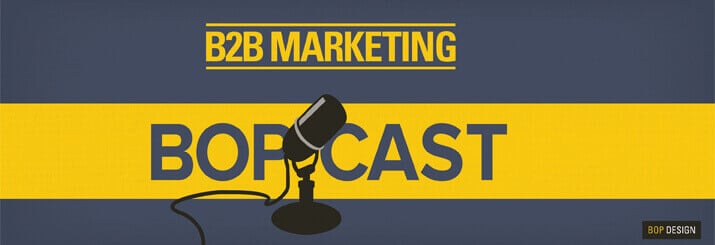 No time to listen? Read the full podcast below:
No time to listen? Read the full podcast below:
Bop Design: Hello, everyone and welcome to the B2B Marketing Bopcast hosted by Bop Design. We’re conducting our first podcast discussion today on Wednesday January 29th. My name is Caroline Gilbert and I am the Content Marketing Manager at Bop Design. Today, I’m speaking with Dr. Rochelle Perper. She’s a Licensed Clinical Psychologist and Founder of Therapy Changes which is located here in sunny San Diego. How are you doing today RP?
Rochelle: Great. Thank you. I appreciate the opportunity to be here.
BD: Awesome. We’re so happy to have you. Today similar to what Therapy Changes does everyday, which is focusing on guidance when it’s needed the most, we’re going to talk about a blog post you authored earlier this month titled “12 Habits of Successful People.”
You started this blog post off by saying, “Success is not just defined by the title you hold, or the things that you have, but rather, from the obstacles that you have had to overcome to be where you are today. Successful people aren’t just born, they have learned the skills to persevere and maintain focus.”
I wanted to kick off with that quote because I think it’s really great summary of how you can define success as not just any old person but a successful businessperson. Addressing the quote above, what would you outline as some common obstacles for business professionals?
RP: I think that the biggest obstacle for business professionals is really negative thinking. In life, and especially in business, inevitably things don’t go according to plan. It’s really easy when that happens to focus on what’s not working rather than on the positive aspects of the business. I think that what happens is when people focus too much on what’s not working, they begin to notice their short comings or their flaws or their failures and they start to generalize that to the future. Maybe they start developing this pessimistic or hopelessness attitude about changes that need to be made.
When you start saying to yourself things like, “This won’t work” or “I can’t do that” then you’re much more likely to flounder, to have difficulty and you’re not as likely to be successful. What I help people do is understand these difficulties or these aspects of business or life that don’t go according to plan as opportunities to learn, develop resilience and see them less as failures. In that way with that new way of thinking about the problem you have that renewed energy and focus to continue in the direction that you’re headed.
BD: That’s great answer in terms of I know many, many times in people’s personal lives they get negative feedback and it can sometimes be a make or break moment where somebody thinks, the work I just performed isn’t a 100% perfect. If you don’t know how to handle that appropriately it can consume the rest of your day.
RP: Absolutely. It’s the common phenomenon of having ten compliments and one negative comment and it’s our human tendency. It’s our nature to focus on that one negative comment. That is important to understand, those opportunities but we do not want to look over all of the positive things, all of the things that really are working and receive those compliments.
BD: Do you have mental tools that you recommend to your patients and clients on how to increase the positive thoughts to circumvent the negative ones?
RP: Yeah, I think that a big part of it—I would say 80% to be truthful—is being aware of the negative thoughts. Because when you’re aware that you’re thinking that way it’s that much easier to make a change. I visualize almost like a scale and for every negative thought that you have, you really need to make a concerted effort to balance out the scale by focusing on something that’s working. It’s not about putting on rose-colored glasses, it’s not about just thinking positively all the time, it’s about creating balance in your thinking and approaching problems and situations more realistically.
BD: Okay. You’re mentioning of the scale and finding balance gets to my next question. Typically before people reach a complete breaking point in terms of feeling overwhelmed by stress and feeling like they are not reaching their goals, there are smaller signs along the way that can tell—that can be emotional or mental indicators that somebody needs to maybe put more positive thought or positive actions to again balance the scale. Could you maybe explain what some of those smaller signs are that people maybe think “Oh, I’m not at a breaking point yet. I’m feeling I’m okay. I don’t need to really put much more thought into this.”
RP: Right, absolutely. I think this is a really great question because so often we get wrapped up in our day to day lives and we’re not really paying as much attention to what’s happening within ourselves. Increasing awareness is really important. One of the biggest signs that I see in professionals who are approaching what you say as a breaking point is negative thinking as we were just talking about. Also, when we’re under a great deal of stress it’s really easy to put all of our problems on the same level and it’s difficult to prioritize. Changes in our thinking like thinking more negative way or having more of an exaggerated reaction to things that are seemingly smaller good signs.
Other signs might include irritability, difficulty finding creative solutions to problems or not being as flexible in your thinking. Also some people might have problems with sleeping, they might have some health problems or muscle tension or stomach problems also strains in your personal relationships or relationships with coworkers. In some cases somebody might be finding themselves drinking more or engaging in less healthy activities. Part of your question is how do we recognize these and I think that paying attention to our physical selves is really important. Hearing feedback from others also others is also really important to catch these signs sooner rather than later.
BD: That’s good to know, there’s probably a lot of people who experienced at least some of those qualities that maybe think that it’s just a bad day but if it’s happening on a repeat basis and it’s starting to consume your life it can be detrimental. Not just recognizing it in yourself but if you were to notice it in a friend or a close coworker, what would you recommend? Is it that individual’s responsibility to point it out or if they feel it it’s their responsibility because they care about that individual? What do you feel is the best approach to make sure it’s not coming off as judgmental?
RP: Right. That’s a good point. When we care about someone we want to make those observations but we don’t want to come across as being judgmental or criticizing. I recommend just coming from a place of concern, making an observation in a neutral way and maybe following that up with how that impacts you. I could say something like “Hey, I’ve noticed that when you come home from work you’re drinking more than what is usual and that’s just making me feel a little unsettled because it’s different from what I’m used to.”
Invite them to a conversation about what’s going on and come less from a place of “I know best” and more coming from a place of an “air of curiosity” trying to understand and learn what’s going on for the person that you care about.
BD: Let’s say a business professional has recognized that these are some common problems in their life or they’ve been told explicitly by a friend or family member but they are resistant perhaps to change. What do you think are some common barriers business professionals have to being successful and overcoming a lot of these obstacles?
RP: I think that ambivalence or the obstacles might come from a feeling of fear of not really knowing where to start. In my role as a therapist, I see a lot of people who are feeling stuck in their life and they have this idea that change needs to happen but they are not quite sure where to start. I help people get unstuck by helping break things down, break down the problem. Sometimes it does help to have an objective, neutral third party to just take a look at your problem with you and help organize your thinking and develop a plan for action.
Because once you have that plan in action and you can take it one step at a time things feel a lot more manageable and you can start recognizing successes that again will give you that motivation and energy to keep going. If you look at the whole big picture it is easy to get overwhelmed and when that happens you might find yourself quitting before you even begin.
BD: In addition to seeking out a neutral party to assist in this barrier recognition process and breaking down the fear and the problems, are there other ways that somebody could take on the issues themselves and personally?
RP: There are a lot of self-assessments and ways that one can actually use some of the tools that I teach in therapy and put it in to practice in our day-to-day life. One of my favorite interventions to use with people who are coming to therapy for the first time or who are just wanting to learn more about how they can self-actualize and optimize their potential is to do an assessment of where you’re actually spending your time. I would draw a big circle, and you can do this at home, on a piece of paper and simply divide up the circle like a pie chart into the areas of your life that consume your time. Remember it’s not your ideal life balance pie chart but it’s really an honest illustration of how you’re spending an average day.
This visual representation of where your time is being spent will help you notice things that you might not have otherwise recognize. Being able to reflect on your life and your life balance in this way can raise some important questions that you can begin to ask yourself like “Is my home life serene? Am I eating regular healthy meals? Do I get enough sleep? Do I get enough exercise? Where is my self-care in the chart? Am I keeping up with my appointments? Do I see my friends?” Those questions and then once you start to look a little bit more closely at where you’re spending your time, the next step is to think about what an idea would be for a more balanced life.
Draw another circle in a piece of paper and divide it up in the same way that you did before but this time depicting the ideal life balance. Really indicate how you would like to fill your time and most likely your work-life balance is going to work somewhere in between those two pie charts. When you have an idea where you’re going, a more clear idea anyways then the action plan starts to naturally fall into place. You’ll be able to ask yourself things like “Where are some areas where I can make change and what are the first steps that I can take towards that kind of change?”
BD: I love that idea and I think I’m going to make a pie chart this evening.
RP: Great, great. It takes a little bit of concerted time but ironically we need to take time out of our life to look more objectively at our lives and set ourselves up for success and be … feel more accomplished.
BD: If somebody decides to take that self-assessment tool or similar one into their own hands and do an at home treatment process, sometimes I think it’s difficult again for people to recognize smaller stresses or think that their state of mind isn’t that detrimental. Would you recommend somebody best separate his or her emotions from that self-assessment process and also separating their emotions from making the decision to change certain aspects of their life to achieve a balance?
RP: That’s actually a really interesting question. Actually I think it’s a common misconception that good decisions are void of emotion. I actually suggest sticking with our theme of balance here that separating emotions is less important than balancing emotions with your rational thinking. In line with this balance, I use the philosophy of Dr. Marsha Linehan who talks about the “wise mind.” Her conceptualization of this is that the wise mind is really, occurs in between the rational mind or the logical part of our thinking and the emotional mind or the emotional part of our thinking.
Research that Dr. Linehan and her team have done really showed to us that when people are operating from their wise mind and creating balance between the two, not only are feeling better but they actually are making better decisions.
BD: That’s a really great point because I think there is a misconception with people who are considered successful, you think about extremely successful business people in the past and present, Steve Jobs or Oprah or the very big personalities out there in business. I think some of them are considered a little bit less on the emotional side and do you think well they are able to make these tough decisions because they can completely separate the two or be completely devoid of emotions if they need to make a decision.
RP: Yeah, let’s not forget where passion comes in. Someone who’s making a decision clearly from a rational or logical perspective is not considering what it is that turns them on, what they are passionate about, what they are excited about. Without that component of a decision making process you’re not going to be as successful as you could be.
BD: Getting to your comment about passion and part of your blog post that you did about the habits of successful people was not just keeping, saying no to things so that you’re not adding more to the unbalance but also saying yes to new challenges. How can somebody best evaluate their workload and decide what should go versus what makes them passionate and what they should say “yes” to?
RP: Right. Actually that’s the very question that many professionals ask when they come to therapy is “Where really should I be challenging myself and saying yes to new challenges and where do I need to cut something out and keep it simple?” I know personally I have grappled with this issue myself. The idea here is I’m really advocating that we devote our time to things that give us a sense of purpose and meaning in our life. Really, we want to cut out the parts that are unnecessary or excess. Even though it might be scary or it might evoke a feeling of anxiety it doesn’t necessarily mean that’s a reason to say “no.” Sometimes if we’re passionate about it or if it really represent an exciting new opportunity, we need to say “yes.”
Other times there are things in our lives that are not really necessary and I call that the “excess.” Knowing the difference between things that are challenging that are going to give us a sense of purpose and meaning and what are things that are excess, it can be hard to know that difference. Sometimes it is helpful to talk to a third party to help you decipher between the two. In general, some questions to maybe ask yourself when deciding whether or not this task is something that you want to take on or politely decline is asking yourself “How do I feel after I finish that task?” or “Is this task productive or what is the potential gain out of this task and how am I measuring that?”
Also, “Is this task interfering with the things that are important to me?” “Is it getting in the way of my family time? Am I having to cut something else out that’s important to me because I’m devoting time to this?” Those are some questions to start you thinking in the direction of is this something to take on or is this something to politely pass on.
BD: I also want to ask and elaborate a bit more on taking on new challenges. Sometimes I think the challenges that other people accept that who are close to us can overflow into our lives too. For example, spouse going through a major job transition or deciding to have another child and add on to your family or something to that effect. Where do you suggest individuals, since it’s not their choice to make to accept that challenge, how do you suggest they balance that?
RP: I think that goes back to your earlier question of how do I provide feedback to someone that I care about in a neutral way and follow that up with the impact that that behavior has on you. Informing the other person what your unique struggle is in relation to their decision. That’s more of a sharing experience and it may or may not actually change that person’s decision or the direction that they are headed. In that case then I always recommend that people reinvest energy back into themselves and really pay attention to where your priorities are and where your self-care is. Because the better you’re taking care of yourself the more equipped you’ll be to handle stresses in your life if they are superimposed by someone else or they are self-imposed regarding challenges that you might take on as your own.
BD: Okay. I wanted to finish up this podcast by getting back to the successful business professionals and typically they are the ones achieving the optimal work-life balance. In the traditional thought of a person who has the great work-life balance, there are certain archetypes such as the working mother or the high level CEO. Typically, these people balance their work and what is defined as their life is “family life,” they have a spouse and children. They are able to balance the two. Do you find that there’s a different kind of unbalance for professionals without children or spouse who are single, working and still have life aspirations but they aren’t perhaps the immediate ones that we think of?
RP: I’m glad you brought that up because you’re right, there are differences in maybe a younger working professional as opposed to someone who’s a little bit more established in their career and has children for example has a family. I think that the advice is the same really because just because the person doesn’t have children, it doesn’t mean that they don’t have a life, right? The life part of the work-life balance can be all sorts of things. It could be relationships, it could be friendships, it can be travel or adventure or for some people it might be spirituality.
For others it might be health and fitness. When unbalance occurs, the person might find that these things are not happening as much as they would like and they start, they might start to sense void and longing for the things in their life that aren’t reaching that view, help them feel more calm and maintain that perspective that they need to make a decision that work.
BD: All right. I think that’s a great point that people are going to have unique challenges and solutions and I think there isn’t a right fit for everybody but the tools you’ve described today in this podcast I think is a great starting point for many people who are facing unbalance and stress, who are trying to achieve that success in their lives.
RP: Thank you.
BD: Of course! That wrapped up our first podcast. Thank you again, Rochelle so much for taking the time to speak with us today.
RP: It’s my pleasure. Thank you for having me.
BD: Just to let everybody know Therapy Changes is based in San Diego, California but you are welcome to visit their website at therapychanges.com. Rochelle and her team blog frequently on many topics revolving around mental and emotional health. Rochelle, if you have anything additional to share you’re welcome to.
RP: No, I think that for people listening to this podcast they’ve already taken the first step to learn a little bit more about themselves. I know it sounds cheesy but the first step to making change in one’s life is recognizing that there is a problem and activities like these and efforts made towards understanding more about your situation and where you want to go is really worth while.
BD: Great. Well, thank you again and have a great rest of the day everyone.
This podcast has been edited for clarity.



